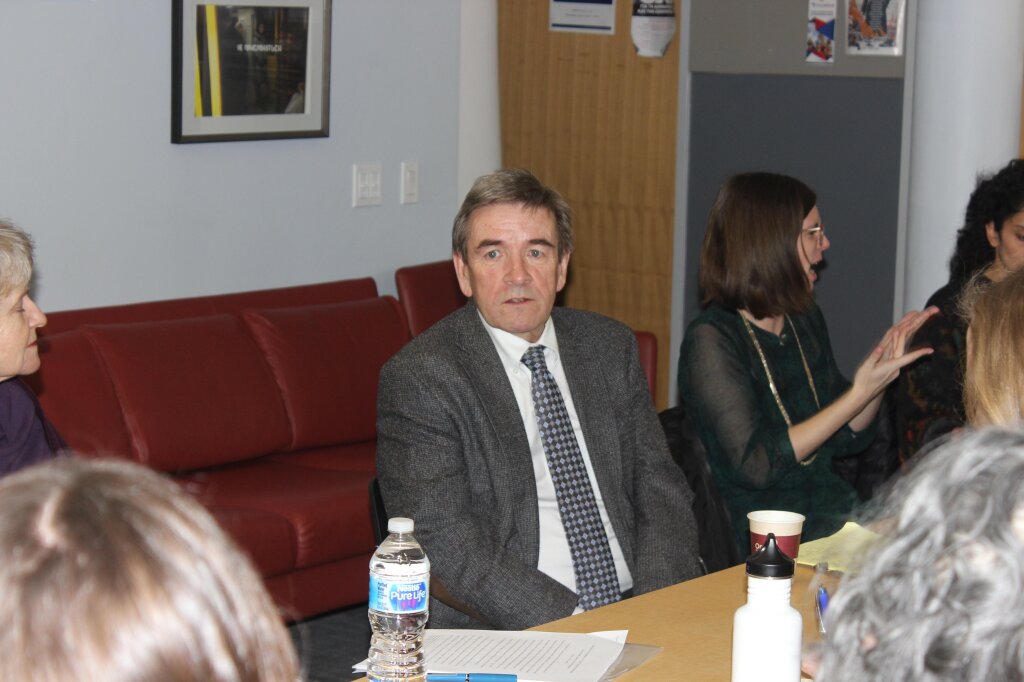Richard Ratzlaff, acquisitions editor for the humanities from the University of Toronto Press, spoke to prospective authors on April 22nd about publishing, and sought to illuminate a process that might appear vague to some scholars.
Yanni Kotsonis, Director of the Jordan Center, welcomed Ratzlaff, and said his presentation would tackle an essential issue for scholars who are currently in the process of writing their dissertation and who want to go on and publish “the book.” Kotsonis emphasized the importance of publishing to humanities scholars. “As an historian, if you don’t have ‘The Book’ you haven’t reached that level of achievement,” he said.
Ratzlaff started with an outline of some basic questions dissertation writers should be asking themselves to ensure they are submitting manuscripts to the right publishers. “The first place you should go is your bookshelf,” he said, advising writers to take stock of the presses that publish materials of interest to their field. Secondly, he advised authors to avoid becoming an “orphan.” This is less than ideal because potential readers may not ever be reached if the topic is an unusual one for the publishing press.
Ratzlaff also laid out the particulars of submitting a proposal. He said that ideally, a proposal would include a 1500-2500 description of the project and a sample chapter. “Show me that you’ve written something, and this isn’t just all in your head,” he said.
Ratzlaff stressed that, if the book proposal is coming directly out of a dissertation, it’s easier if the authors are up-front about their plans for revision. The more revision, the better he said, emphasizing the market is such that publishers are not interested in publishing unrevised dissertations-- this type of monograph is a very hard sale given the availability of dissertations on the Internet. Ratzlaff said the same revision rules apply to embargoed dissertations as well.
He also reminded authors to include their target audience when submitting a proposal: “Be precise about who you’re writing for. Books that are focused do better.” And finally, writers should talk about how their contribution is both unique to the field, and how their research fits into the discipline’s trajectory. “Don’t assume your editor is an expert in the field,” he said.
One attendee asked how much of the book project should be completed before submitting a proposal to a publisher. Ratzlaff said authors typically submit proposals before they start making revisions to their dissertation. In this way, scholars can ensure there’s interest in their topic, and can close an advanced contract prior to going to great lengths to rewrite.
Ratzlaff said that some of the best advice he could give is, “just write a book from the outset if you can.” And at the very least, he said, authors should shelve the really brilliant book and chapter titles until they are ready to submit a manuscript for book publishing.
Making superficial changes to a dissertation is just as important as making deeper ones, Ratzlaff said. He referred to one incident in which the author had almost completely rewritten their dissertation, but failed to change the table of contents in their final submission for a book, which Ratzlaff explained would be a red flag for library wholesalers who aim to avoid purchasing unrevised dissertations.
Ratzlaff also strongly advised scholars against publishing articles that they might later wish to include in their book. “If you have five chapters in your book, and three of them are already out there, publishers will assume the best stuff is already out there,” he said. He also warned that some journals will charge a fee if an author chooses to republish an article as a chapter in their book.
Ratzlaff also addressed the politics of multiple submissions. “I take this for granted,” he said. Submitting to a variety of publications is fair game until the peer review stage, though this isn’t true in every case. If a monograph is exceedingly desirable, Ratzlaff said his press goes to great lengths to publish it.
Another audience member wondered about how long writers should expect to wait after submitting their proposal to hear back from publishers. Ratzlaff said that at his press, a quick reply can arrive anywhere from 4 to 6 weeks after an exciting submission. But, he said, the average is about 8 weeks from proposal to advanced contract.
Overall Ratzlaff’s presentation should sit well with prospective authors who have recently completed their dissertations or have finished ones on the horizon. Ratzlaff reminded the audience that, though the process may seem intimidating, “it’s a two-way street-- we want you too, we want to publish, and we want to publish good manuscripts.”


